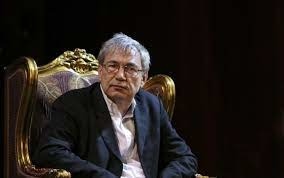Every two weeks, on Tuesdays, lepetitjournal.com Istanbul offers you a “Let’s talk about Turkey…” meeting through short texts by Samim Akgönül, author of the “Unusual Dictionary of Turkey”. You are invited to discover concepts, words and expressions or little known facts but also unusual characters from the Turkish space, inspired by the dictionary in question. Today, the letter “K”…
***
If Homer had a modern reincarnation, it would undoubtedly be Kemal Sadık Gökçeli, known worldwide by his pen name Yaşar Kemal.
Born in 1923 into a family of Kurdish origin, Yaşar Kemal began a career as a journalist where he distinguished himself during the 1950s as a reporter and interviewer. On the other hand, it is his epic novels, such as the series of Memed the Thin whose four volumes are deliciously translated into French by Güzin Dino and Münevver Andaç who make it known worldwide.
Yaşar Kemal, a storyteller of rurality
The first Turkish-language writer (although he is of Kurdish origin) to be a candidate for the Nobel Prize for Literature, Yaşar Kemal was very quickly known in France, becoming one of the favorite authors of the Mitterrand couple in the 1980s. imposing physique, one-eyed with a cavernous voice, his writing was of exceptional finesse, developing a unique style between Alexandre Dumas and Haruki Murakami. These themes were mostly honor, class oppression, and nature, especially in southeastern Anatolia. His last series An island story (of which two volumes are translated into French by Altan Gökalp and Alfred Depeyrat at Gallimard editions) touches on the theme of the sea and the Greek-Turkish conflict, in a lyrical and epic way with supernatural descriptions as usual. A socialist until his last breath, Yaşar Kemal died in 2015 at the age of 91, leaving behind him a way of storytelling that has always been imitated, never equaled. He was Commander of the Legion of Honor since 1984, and Doctor Honoris Causa of the University of Strasbourg since 1991.
Memed was in a state of extreme excitement. He couldn’t sleep. He was overwhelmed with thoughts. Ideas raced through his head. He was thinking now. The world had grown in his head. He thought about the greatness of the world. The village of Degirmenoluk was no more than a tiny speck in his eyes. The almighty Abdi Agha was no more than an ant. Basically, it was perhaps the first time he really thought. He reflected with love, with fervor. He was thinking for the first time, beyond his means. He was beginning to hate. He felt himself mature. He became aware of himself. “Abdi Agha is a man, we are too”, he said to himself, turning over in bed… (Memed the ThinTranslated by Güzin Dino).
Orhan Pamuk, a city storyteller
Orhan Pamuk is also a storyteller, who certainly admires Kemal’s work. But if Yaşar Kemal is the man of rurality, from Çukurova to the Aegean Sea, Orhan Pamuk is that of the City, of polishedfrom Istanbul.
“He who, in the search for the melancholy soul of his hometown, has discovered new symbols for the clash and intertwining of cultures”. Here is the justification for the Nobel Prize in Literature awarded to Orhan Pamuk in 2006. Born in Istanbul in 1952, Orhan Pamuk is definitely an urban author who scrutinizes book after book this “melancholic soul” of Istanbul, through the stories of great heroes like little people who become great heroes under his pen.
The one who wanted to become a painter chose his pen to depict complex landscapes where the spectator sees not only the city but those who walk there every day with astonishing thoughts, as is the case in This strange thing inside me (2014, translated by Valérie Gay-Aksoy) or The woman with red hair (2016, translated by Valérie Gay-Aksoy)
Whoever tried to study architecture without success, builds impeccable stories with curved angles like The Museum of Innocence (2011, translated by Valérie Gay-Aksoy).
Since his first intimate novel Cevdet Bey and his sons (1982, published in French in 2014, translated by Valérie Gay-Aksoy), Orhan Pamuk innovates with each novel, sometimes historical as my name is red (2001, translated by Gilles Authier) sometimes political as The snow(2005, translated by Jean-François Pérouse).
A liberal spirit, he has repeatedly criticized the Turkish regime and the atrocities committed in history against the Armenians and today against the Kurds. In 2005, these comments earned him a trial under Article 301 of the Turkish Penal Code (insult to the Turkish nation) and he then considered exile. Since the case was dismissed in 2006, under pressure from intellectuals and writers around the world, Pamuk has shared his life between Istanbul and New York, where he teaches comparative literature.
***
Latest publications by the author:
> Akgönül Samim (ed.), Turkish modernity: adaptations and constructions in the process of Ottoman and Turkish modernizationIstanbul, Isis Editions, 2022;
> Akkonul Samim, Unusual Dictionary of TurkeyParis, Cosmopole, 2021;
> Akkonul Samim, The “new” Turkey and the Franco-Turks: a complex interdependence, Paris, L’Harmattan 2020.
We want to give thanks to the author of this short article for this amazing material
Yaşar Kemal and Orhan Pamuk, two storytellers with different worlds
You can find our social media profiles and the other related pageshttps://nimblespirit.com/related-pages/

